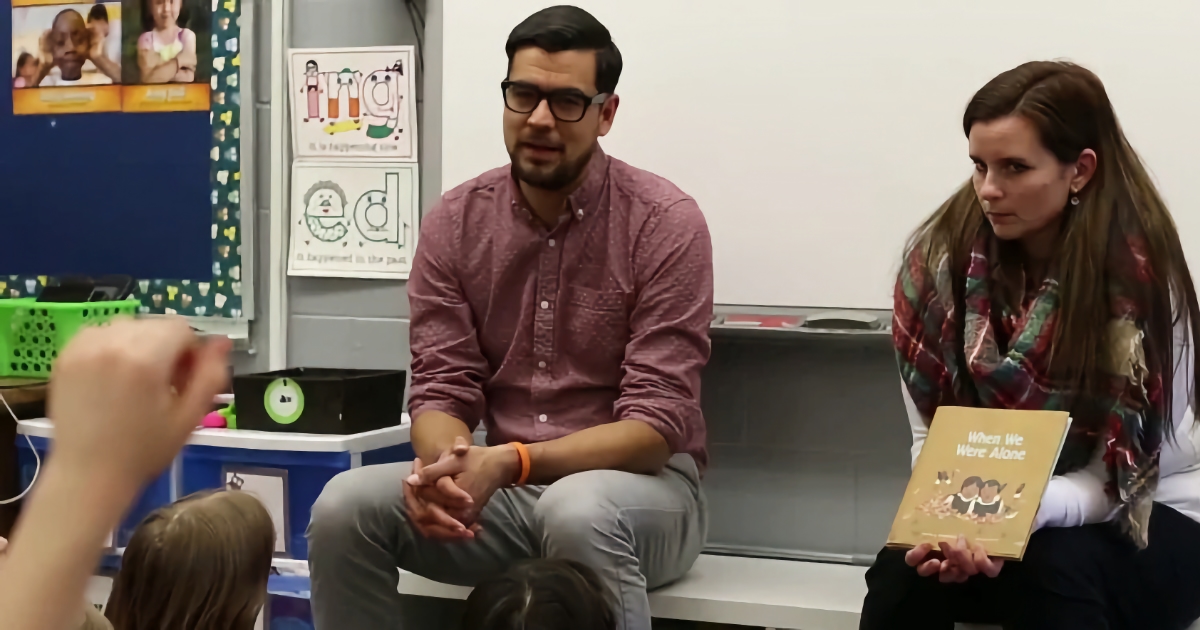
Nov 25, 2019 12:00:00 AM
In the elementary classroom, teachers often shy away from teaching a more critical viewpoint of “traditional history” for fear of how this shift will be received by parents or others. However, they are all eager to teach students how to read, to love reading and how to read for information. Teaching critical literacy impacts and lifts the level of reading for information.
Critical literacy is teaching children to think deeply and talk thoughtfully about social issues by using quality texts. It is a method that encourages students to perspective-take, empathize, form an opinion and draw their own conclusions. Even a “bad” text (i.e. full of stereotypes and historical inaccuracies) can lead to amazing critical conversations when paired with another book and time to think critically and engage in dialogue.
Harste gives some criteria that teachers can use to find books that lend themselves to critical literacy. These books should have at least one or more of the following traits:
Additionally, teachers should consider the writer’s identity, intent, and the social and historical context of the text.
One of my favorite questions to ask is, “Whose voice is missing?”
This question can provoke thoughtful conversation and inquiry. Specifically for Thanksgiving, with many books, we will find that the voices of Indigenous People are missing. How would you feel if a story was written about you and no one asked for your opinion?
From here you can take students on a critical literature hunt to find the missing voices. Do we know how the colonists felt? Do we know how the Native People felt? The unwavering sense of fairness for elementary students makes a critical look at a text fairly reasonable. This concept can be easily attained preemptively with classics such as “The Three Little Pigs” and the varying tales with perspectives from the wolf and other animals.
Students can use graphic organizers to compare and contrast different texts about Native Americans before colonization, after, and now.
This timeline allows students to de-center colonizer narratives, and acknowledge the existence of Indigenous people before it, as well as the reality that Native people still live in the U.S. today.
One text that does this well is “When We Were Alone” by David A. Robertson, an Indigenous writer. It addresses resistance through actions, holding on to culture, passing down culture, empowerment and triumphant resilience through the voice of Indigenous People. It tells the critical truth of a challenging and painful history in a developmentally appropriate way.
Without indoctrination, teachers can help students use critical literacy to engage with any concept as a means to decide for themselves how they feel about colonization. Teachers can tackle writing objectives for compare and contrast essays, persuasive essays and even information books.
Critical literacy can be used to teach students how to debate, and can even prompt student voices to act for change in their own schools around curriculum and even school holiday observances. Critical literacy is ultimately a life skill that empowers students to take action in their daily lives.
Erica Snowden, a Detroit native, has been an educator for 16 years within the Friends Schools network. Erica earned her bachelor's in biology from Lincoln University, a master's in the art of teaching from Marygrove College and a master's in educational leadership from the University of Pennsylvania. Currently, she is the Lower School Dean at Greene Street Friends School in Philadelphia.
Erica serves as the Diversity Clerk, promoting social justice and race-based conversations within middle school affinity groups, lower school racial literacy groups, faculty and staff. This work resulted in the creation of Stay Woke Day, a city-wide, student-led conference on racial awareness and intersexuality. Erica co-founded GSAFE (gender and sexuality alliance for everyone) with colleagues to provide a safe space for students and allies who identify with LGBT+ goals and initiatives. She is the founder of FRAGRANCE, (faculty racial affinity groups promoting racial awareness, normalization, and change in education).
In addition to being a contributing author to The Guide for White Women Who Teach Black Boys, she has published in the Journal of Ethical Educational Leadership. Erica has presented at several conferences including, the Multicultural Resource Center at the Association of Delaware Valley Independent Schools Diversity, Equity and Inclusion Conference (MCRC@ADVIS), the MCRC@ADVIS Cheryl Irving Cultural Competency Institute, the Pennsylvania Association of Independent Schools conference (PAIS), and The National Association of Independent Schools conference (NAIS).
Erica he has given talks at the University of Pennsylvania and Rutgers College on topics of diversity, equity and inclusion. She was the closing keynote at the Greater Philadelphia Diversity Collaborative’s (GPDC) conference, "Nurturing Critically Engaged Citizens." She is a recipient of the 2019 DiversityIS magazine Leadership in Diversity Award.
Erica is also a Lion's Story Racial Literacy Trainer.The story you tell yourself about your own math ability tends to become true. This isn’t some Oprah aphorism about attracting what you want from the universe. Well, I guess it kind of is, but...
If you have a child with disabilities, you’re not alone: According to the latest data, over 7 million American schoolchildren — 14% of all students ages 3-21 — are classified as eligible for special...
The fight for educational equity has never been just about schools. The real North Star for this work is providing opportunities for each child to thrive into adulthood. This means that our advocacy...
Your donations support the voices who challenge decision makers to provide the learning opportunities all children need to thrive.
Ed Post is the flagship website platform of brightbeam, a 501(c3) network of education activists and influencers demanding a better education and a brighter future for every child.
© 2020–2024 brightbeam. All rights reserved.
Leave a Comment